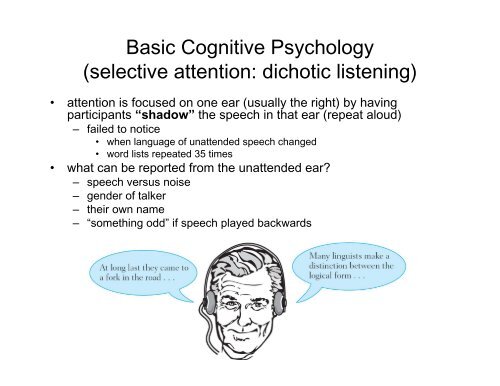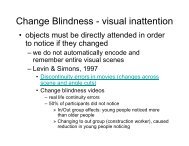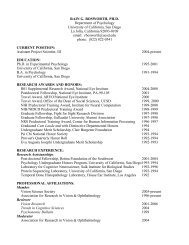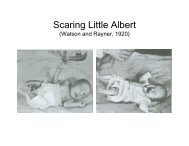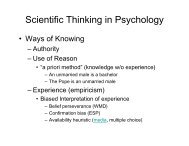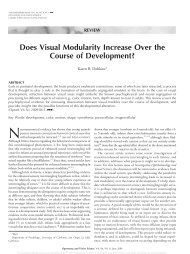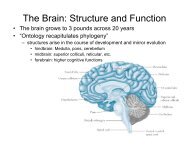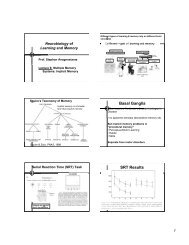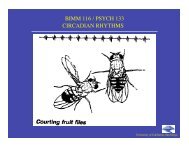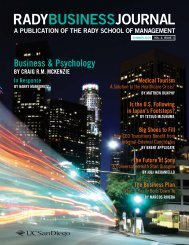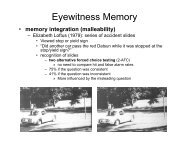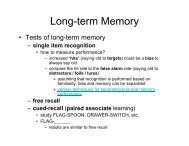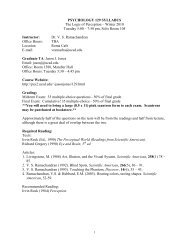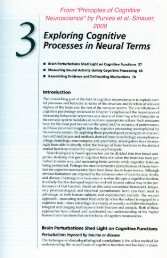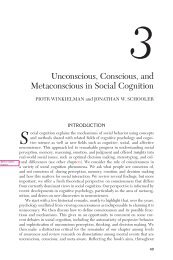Basic Cognitive Psychology (selective attention: dichotic listening)
Basic Cognitive Psychology (selective attention: dichotic listening)
Basic Cognitive Psychology (selective attention: dichotic listening)
You also want an ePaper? Increase the reach of your titles
YUMPU automatically turns print PDFs into web optimized ePapers that Google loves.
<strong>Basic</strong> <strong>Cognitive</strong> <strong>Psychology</strong><br />
(<strong>selective</strong> <strong>attention</strong>: <strong>dichotic</strong> <strong>listening</strong>)<br />
• <strong>attention</strong> is focused on one ear (usually the right) by having<br />
participants “shadow” the speech in that ear (repeat aloud)<br />
– failed to notice<br />
• when language of unattended speech changed<br />
• word lists repeated 35 times<br />
• what can be reported from the unattended ear?<br />
– speech versus noise<br />
– gender of talker<br />
– their own name<br />
– “something odd” if speech played backwards
Applied <strong>Cognitive</strong> <strong>Psychology</strong><br />
(dual task: cell phones and driving)<br />
• Simulated driving with video<br />
game (Strayer and Johnston,<br />
2001)<br />
– Compared <strong>listening</strong> versus<br />
conversation<br />
– Conversation (word generation)<br />
impaired driving<br />
• <strong>attention</strong>al bottleneck in planning<br />
what to say<br />
• Simple shadowing did not impair<br />
driving<br />
• “hands free” didn’t help<br />
– What about conversation with<br />
people in the car?<br />
• people in the car know when to<br />
be quiet
• Location<br />
– Laboratory vs. field research<br />
• Control<br />
• Ecological validity (realistic)<br />
• <strong>Basic</strong> / applied<br />
• Situations / risk<br />
• ethics<br />
– Dutton and Aron’s (1974)<br />
romance in high places<br />
• Quantitative versus Qualitative<br />
research<br />
– Analytical narratives<br />
• Case studies<br />
• Observation studies
• Asking empirical questions<br />
– Answerable with data<br />
– Terms precisely defined<br />
• Operational definitions<br />
– Defining concepts in terms of a set of operations to be<br />
performed<br />
• Operationalize Hunger<br />
– induce hunger: not feeding rat for 12 hrs.<br />
– measure hunger: press lever for food<br />
–Objective<br />
– Replication<br />
– Converging operations<br />
• different operational definitions producing similar results<br />
– operational definitions for:<br />
• Memory, <strong>attention</strong>, awareness, perception
• Developing Research<br />
– From Observations and serendipity<br />
• Hubel and Wiesel (1959)<br />
– From Theory<br />
• A theory (subject to revision)<br />
– Summarizes existing knowledge concisely<br />
– Provides relationships between variables<br />
– Provides explanation<br />
– Makes predictions<br />
• A construct<br />
– Hypothetical factor, not observed directly<br />
– Interference/inhibition, cognitive dissonance<br />
• Deduction<br />
– Reasoning from a set of statements towards the prediction<br />
• Hypothesis (the prediction)<br />
• Induction<br />
– Reasoning from specific events to a theory
• Can only disprove theories (never prove, just find<br />
support for)<br />
– Logical fallacy of affirming the consequent<br />
• all crows are black: If a bird is a crow, then it will be black<br />
• you see a black bird<br />
• fallacy: therefore, it must be a crow<br />
– Logically correct modus tollens<br />
• If a bird is a crow, then it will be black<br />
• you see a yellow bird<br />
• correct: therefore, it cannot be a crow<br />
– Is one negative result grounds for disproof?
• Attributes of good theories<br />
– Maggie the mathematical dog<br />
– Productivity<br />
– Falsification<br />
– Parsimony (minimum constructs)
• Developing research from other research<br />
– Programmatic research<br />
• Unanswered and what next questions<br />
– suggestions in discussion section<br />
– alternative explanation<br />
– individual differences<br />
– age and SES groups<br />
– different cultures<br />
– adapting procedures to other research areas<br />
• Replication and extension (partial replication)<br />
– Exact replication (last resort)<br />
• Creative thinking in science<br />
– Figuring out new paradigms (maze learning)<br />
• “chance favors the prepared mind”<br />
– Narrow use of a paradigm can block creativity<br />
• Centrifugal swing


